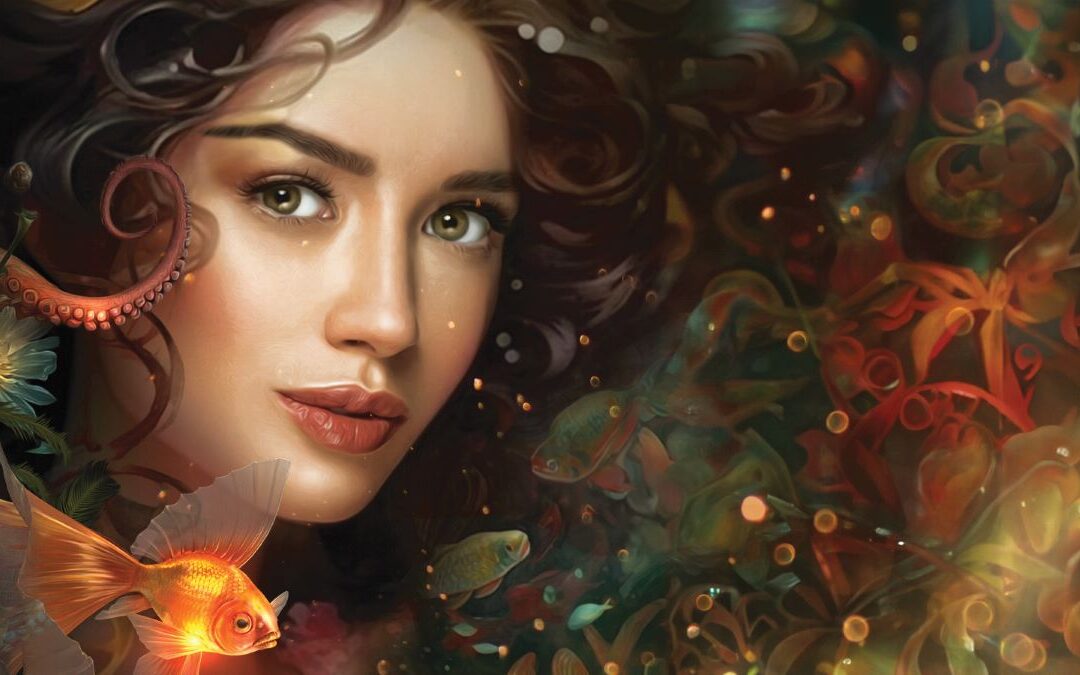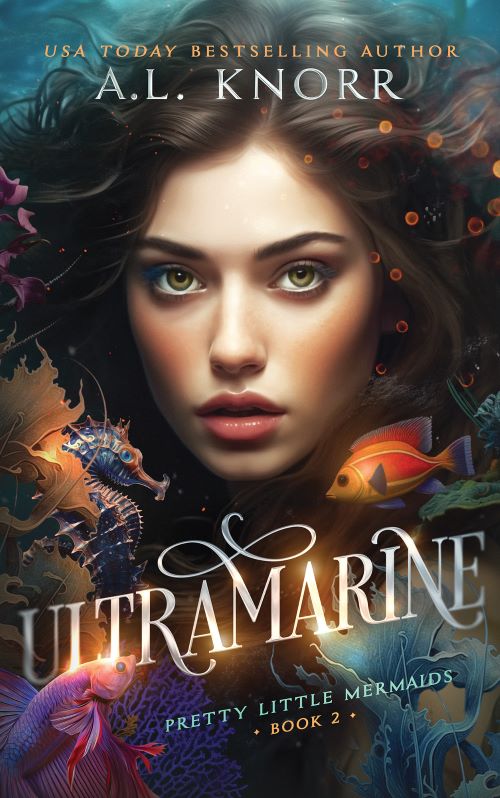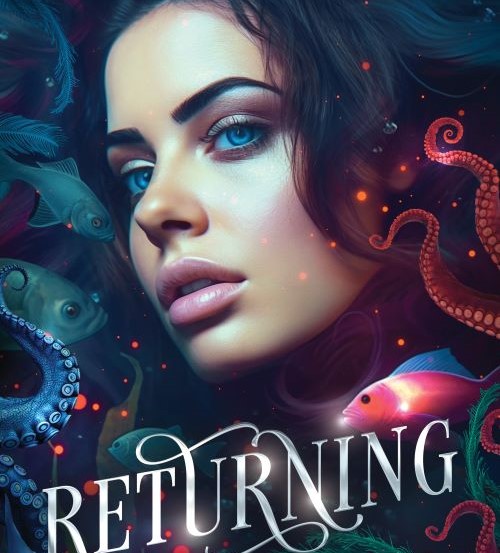Spring, 1939
My mother, Sylvana, had a gorgeous tailfin. At least, I thought it was beautiful. Of course, I was not yet twelve and had never met another siren, but I could not possibly imagine scales more beautiful than hers: ink-blue. Near her flukes, they’re so dark they’re almost black. When the moon was full and there were no clouds, I enjoyed the way the light turned her fins from onyx to navy. Some patches of her scales glinted with the deepest, richest shade of ultramarine blue, so intense that it looked like an artist had mixed the pigments. I wasn’t sure how my tailfin ended up the color of a not-quite-ripe peach—pale greens, oranges and pinks blur together in a patchwork across my flanks. Mother said it’s far more beautiful than hers, but I disagreed.
On this night I chased the ink-blue and ultramarine tail that I loved so much across the floor of the Hudson river, dodging scrap metal and clumps of seaweed. We passed beneath an Atlantic sturgeon, looking like a creature straight out prehistory as it lurked beneath the waves. I giggled as I followed the pattern Mother left for me in the form of bubbles, forcing me to practice banking up and down, left and right, working the musculature of my fins to make me fast and strong. I was beginning to pant because we were swimming against the current, heading home after hours in the glorious water of the Atlantic.
“Keep going, Mother,” I called between breaths as I saw her bank toward the concrete walls that channel the Hudson past Manhattan. “Just a little longer. Please?”
Her laugh drifted back to me, and I was gleeful when she swam past the ladder that would, when our adventure was over for the night, take us up to the pavement where our clothing was stashed. Fresh energy surged, thrilled that we got a little more time together as sirens. As sirens we were free. We could forget life for a while, and Mother was playful and adventurous in a way that she couldn’t be in her human form. I worked to catch up to her. She slowed, letting me come alongside. We swam in companionable silence, still heading upriver.
I didn’t get to swim with my mother as much as I would like. It was dangerous to enter and exit the water in a city as busy and crowded as New York, even in the middle of the night, but she knew how to be invisible. She’d taught me where the most secluded access points were, what times of night were the best for sneaking out and back in again, and how to use shadows to stay hidden. Only once had she had to chase down a human and wipe their mind of what they saw: a mermaid taking her human shape as she emerged from the Hudson.
We never went upstream, always down, so I’d always been curious about where the other direction led.
<spoiler content removed>
I was about to tell her I was ready to go home when a strange shape on the river bottom caught my eye.
“What’s that?” I asked, pointing.
Before we got much closer, Mother took my hand, saying in a strange voice, “It’s nothing, Ginevra. Let’s go home.”
“It’s not nothing,” I said, feeling her grip tighten.
Pulling free, I drew close enough to get a proper look. My heart cased over with ice as I recognized what I was seeing: two pale sticks standing upright on the bottom of the river; a set of human legs from the knees down, the bones of its feet and ankles encased inside a cement disk. The flesh had decayed away, leaving the tibia and fibula exposed. The sight chilled me to the core.
Mom let me look for a while, then said, “Let’s go, Ginevra. Let him rest in peace.”
“How do you know it’s a him?” I asked in a voice that didn’t sound like mine. Death was somehow repelling and fascinating to me at the same time. I’d never seen a dead body before, let alone body parts, at the bottom of the Hudson. Nonna passed away before I was born, and my mother’s parents were long gone. I’d seen drawings of skeletons inside a collection of fairy tales on my bookshelf, but that was the extent of my exposure to human remains.
“The bones are small. It was a girl, don’t you think?” I said.
“This kind of thing doesn’t usually happen to women, Ginevra.”
“This kind of thing?” The statement was enough for me to stare at my mother in surprise. “You say that like this is an everyday occurrence. The only way for his or her feet to get locked in cement like that is to step into it while it’s wet. This is a murder.”
“Yes. Which is why we should leave.”
“Why, do you think the murderer is going to come back?” I said, with more snark than I should have. Mermaid or not, I was still a pre-teenager.
“Ginevra, don’t be sarcastic with me,” my mother chided. “Someone lost their life in a horrible way. I don’t need you having bad dreams about it. Andiamo. We’ve already been gone too long.”
Reluctantly, I turned away from the corpse, but as I did a glint in the sand caught my eye. Brushing away the sludge and sediment of the river bottom revealed a wristwatch. Thinking of Nonno, I picked it up then sped to catch up to my mother.
#
The next morning, the first thing I saw when I opened my eyes was that wristwatch sitting on my bedside table. Instantly awake, I reached for it. It was heavy, and of course broken. The arms had stopped at eight minutes after three. I had a pretty good imagination, and developed a story that it had belonged to the skeleton, that it had been fastened to his wrist—it was a man’s watch—when he was thrown into the Hudson to drown, marking the time of his death shortly after three a.m., because who would throw someone with their feet locked in cement into the Hudson at three in the afternoon? The watch had fallen off and drifted a short distance away, pushed by the currents. I examined every inch of it. Had I seen this watch in a magazine advertisement or on some actor’s wrist in a picture? If I told my mother that it was familiar, she would kiss my forehead and call me fanciful. I was fanciful, I was told so all the time, but that didn’t change the feeling that I’d seen this watch—or one very much like it—somewhere before. It had a metal band and a rectangular face. A brand name was written in tiny letters just below the twelve: GRUEN, and just beneath that, VERI-THIN. Hoping for an engraving, I turned the watch over. I was rewarded with the initials M.P.N in fine script. I ran my thumb over the tiny letters, sifting through all the people I knew for a possible fit. A girl at Brearley, my all-girls school, one grade below me, whose name was Meredith Nicholson, but that’s the only acquaintance I came up with, and she was very much alive and not tied to this watch.
“Ginevra, breakfast!” Nicoletta knocked on my door. “Out of bed lazy bones.”




Recent Comments